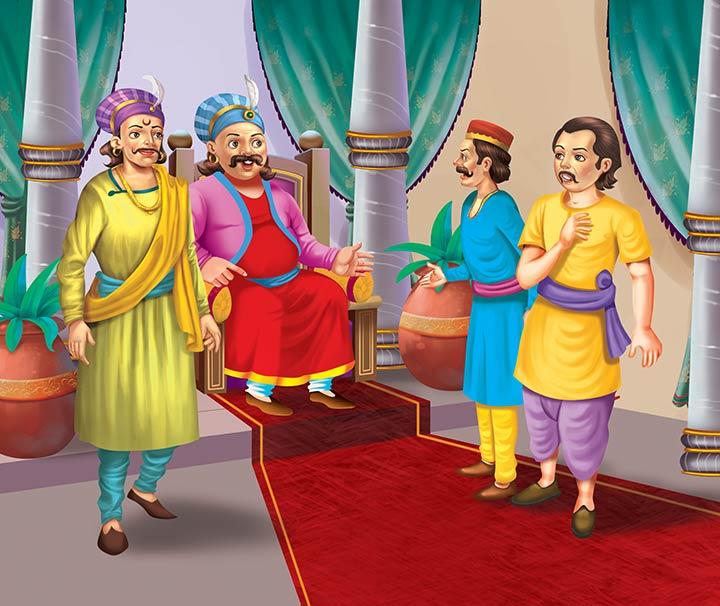Once upon a time, there was a farmer who wanted to water his crops. Since the river was far away, he wanted to buy a well. There was a rich man who owned a well.
The farmer purchased the well from the rich man for a price of 5 silver coins. The rich man was very cunning and wanted to cheat the farmer. He wanted to earn more money.
TranslateEs war einmal ein Bauer, der seine Ernte gießen wollte. Da der Fluss weit weg war, wollte er einen Brunnen kaufen. Es gab einen reichen Mann, der einen Brunnen besaß.
Der Bauer kaufte den Brunnen vom reichen Mann für einen Preis von 5 Silbermünzen. Der reiche Mann war sehr gerissen und wollte den Bauern betrügen. Er wollte mehr Geld verdienen.
The next day, the farmer went to the well with a bucket to draw water from the well. The rich man was standing outside the well and was smiling broadly.
The rich man said, “I have sold you only the well and not the water. If you want to take water from the well, you must pay me one silver coin every week.”
TranslateAm nächsten Tag ging der Bauer mit einem Eimer zum Brunnen, um Wasser aus dem Brunnen zu schöpfen. Der reiche Mann stand vor dem Brunnen und lächelte breit.
Der reiche Mann sagte: „Ich habe dir nur den Brunnen und nicht das Wasser verkauft. Wenn du Wasser aus dem Brunnen nehmen willst, musst du mir jede Woche eine Silbermünze bezahlen.“

The poor man tried to argue but the rich man refused to listen. The rich man had many servants and the poor man could not fight the rich man for the water.
Not knowing what to do, the poor man began to cry. His neighbour saw him and said, “My dear friend, go to King Akbar and ask for justice. King Akbar is a great king and he shall help you.”
The poor man went to the king and complained about the rich man. Akbar listened patiently and looked at his minister Birbal.
TranslateDer arme Mann versuchte zu streiten, aber der reiche Mann weigerte sich zuzuhören. Der Reiche hatte viele Diener und der Arme konnte den Reichen nicht um das Wasser kämpfen.
Der arme Mann wusste nicht, was er tun sollte und fing an zu weinen. Sein Nachbar sah ihn und sagte: „Mein lieber Freund, geh zu König Akbar und bitte um Gerechtigkeit. König Akbar ist ein großer König und er wird dir helfen.“
Der arme Mann ging zum König und beschwerte sich über den reichen Mann. Akbar hörte geduldig zu und sah seinen Minister Birbal an.
Birbal said, “My Lord, I shall take care of this. I shall go and pay a visit to this man.”
Birbal was a very famous minster who was known for his intelligence and wit. He went with the farmer to the rich man’s house.
TranslateBirbal sagte: „Mein Herr, ich werde mich darum kümmern. Ich werde diesem Mann einen Besuch abstatten.“
Birbal war ein sehr berühmter Minister, der für seine Intelligenz und seinen Verstand bekannt war. Er ging mit dem Bauern nach dem Haus des reichen Mannes.
The rich man laughed and explained to Birbal, “Dear Birbal. I have only sold the well and not the water. If I sell a pot, should I also give away whatever is inside? That is not fair”
Birbal said, “You are absolutely right. Does the water belong to you?”
The rich man said, “Of course it does.”
TranslateDer reiche Mann lachte und erklärte Birbal: „Lieber Birbal. Ich habe nur den Brunnen verkauft und nicht das Wasser. Wenn ich einen Topf verkaufe, sollte ich dann auch alles verschenken, was sich darin befindet? Das ist nicht fair”
Birbal sagte: „Sie haben absolut Recht. Gehört das Wasser Ihnen? “
Der reiche Mann sagte: “Natürlich.”
Birbal said, “Then your water is occupying the well belonging to the farmer. You must pay him 2 silver coins weekly as rent.”
The rich man realized that he could not cheat the farmer anymore. He apologized to the farmer and to Birbal. He also paid the farmer 1 silver coin as a penalty.
TranslateBirbal sagte: „Dann besetzt Ihr Wasser den Brunnen des Bauern. Sie müssen ihm wöchentlich 2 Silbermünzen als Miete bezahlen.“
Der Reiche erkannte, dass er den Bauern nicht mehr betrügen konnte. Er entschuldigte sich beim Bauern und bei Birbal. Er zahlte dem Bauern auch 1 Silbermünze als Strafe.
Moral: “Ability proves itself by deeds.”
Translate Moral: “Fähigkeit beweist sich durch Taten.”
Hope you had fun learning German through short stories 🙂 If so leave a comment!!!
For more languages:
Learn German through Short stories: https://childhood-stories.com/German
Learn Spanish through Short stories: https://childhood-stories.com/Spanish
Learn Italian through Short stories: https://childhood-stories.com/Italian
Learn Dutch through Short stories: https://childhood-stories.com/Dutch
Learn French through Short stories: https://childhood-stories.com/French
Learn Portuguese through Short stories: https://childhood-stories.com/Portuguese
Learn Portuguese through Short stories: https://childhood-stories.com/English
About: Studying through Dual Language immersion is among the best techniques for learning a new language. The objective of this website is to teach yourself how to read and speak German confidently using English as a base 🙂 These German short stories are super cool to read for beginners and also for entertaining children. Aesop’s Fables are among the best stories that can be studied on a daily basis.
About the Editor
The author of this German dual language short story is a C1 Goethe certified German language expert. He has over 5 years’ experience in teaching German and over 8 years learning.
He has conducted over 1000 plus hours of classes to over 300 students. In simple words (his words as well as his student’s words), he is AWESOME!!! He can be reached out to at deindeutschlehrer24@gmail.com
He also provides German Language courses for A1, A2 and B1 levels. Below are the details for the same:
Fees for A1, A2 and B1 levels are 120€,140€ and 160€ respectively.


